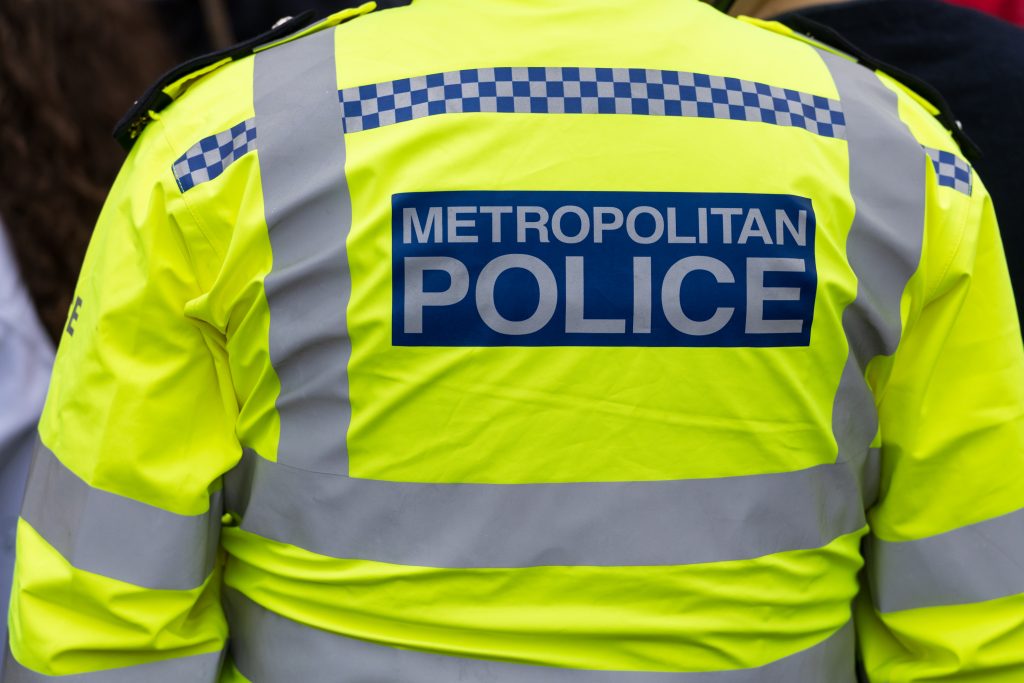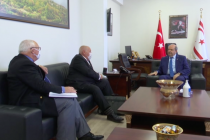The display of flags of a banned Kurdish terror group remain online despite complaints being lodged with the Metropolitan Police nearly three months ago.
The Kurdish Workers Party (PKK) is a proscribed group in the UK, and its promotion is strictly prohibited under UK terror laws.
Photographs appeared on social media from this year’s Kurdish Newroz event in Finsbury Park, North London, on Sunday, 20 March, which clearly show people holding the PKK flag: a red five-pointed star in a yellow circle with a green border on a red background.
T-VINE editor Ipek Ozerim reported the flags to the police after seeing a tweet by the National Federation of Greek Cypriots (NFC), with its head Christos Karaolis posing with PKK flags behind him.
The same photos have been shared on the organisation’s Facebook and Instagram pages, and shared and retweeted multiple times by others, including MPs Feryal Clarke and Bambos Charalombos.
While there is no suggestion Mr Karaolis or the NFC are responsible for the PKK flags, publishing the flag or logo of proscribed groups still constitutes an offence under the Terrorism Act.
Ozerim’s tweet on 22 March alerting Met Police about the photographs received an immediate response and she was given a case number to be able to track the investigation. Yet there has been no discernible action since, despite it being 11 weeks since the complaint was first lodged and the matter being further raised by Turkish officials.
A spokesperson for the Turkish Embassy in London told T-VINE that they raised the issue of the display of PKK flags in Finsbury Park with the UK authorities.
The lack of action to remove the photographs of the terror group the clear evidence of their display begs the question whether the police take the PKK seriously. T-VINE put this and other questions to the Metropolitan Police. A spokesperson for them sent is this written reply:
“We take all reports of suspected terrorism-related activity extremely seriously and we give every report and investigation the same level of rigour, regardless of the suspected ideology, or terrorist group to which it may be connected.
When asked about how long the case would take given the evidence on social media, the Met Police spokesperson responded:
“Each and every investigation will progress depending on the particular circumstances of that case, and therefore we cannot state how long any investigation might take. However, with every counter terrorism investigation, public safety is our top priority and we will look to take appropriate action as quickly as possible whenever we identify there may be a threat to the public in order to keep the public safe.”
The PKK has been on the UK’s terror list for decades, which also begs the question, ‘why are the police not more alert to the display of their flag, especially at an event for Kurdish people where PKK supporters are likely to attend?’
T-VINE asked the police what briefing their officers get before such events and was told:
“The Metropolitan Police briefs officers prior to events where it is suspected that symbols used by proscribed organisations may be present. In the event an incident is identified, the designated crime lead for the event is available for consultation. However, it is not possible to anticipate every event where a symbol may be displayed that may represent a proscribed organisation. It is also important to remember there is no list of specific proscribed symbols linked to these groups and each case is based upon a strict evidential test.”
This isn’t the first time the Metropolitan Police have been slow to act over the PKK. Five years ago, T-VINE reported the police failing to arrest supporters of the PKK following a clash in East London. PKK supporters with flags tuned out to try and prevent Turkish government speakers and supporters from attending an event at Walthamstow Assembly Hall to commemorate the first anniversary of the attempted coup in Turkey.
The Terrorism Act 2000
Under the Terrorism Act 2000, it is a criminal offence to:
- belong, or profess to belong, to a proscribed organisation in the UK or overseas (section 11 of the Act)
- invite support for a proscribed organisation (the support invited need not be material support, such as the provision of money or other property, and can also include moral support or approval) (section 12(1))
- express an opinion or belief that is supportive of a proscribed organisation, reckless as to whether a person to whom the expression is directed will be encouraged to support a proscribed organisation (section 12(1A))
- arrange, manage or assist in arranging or managing a meeting in the knowledge that the meeting is to support or further the activities of a proscribed organisation, or is to be addressed by a person who belongs or professes to belong to a proscribed organisation (section 12(2)); or to address a meeting if the purpose of the address is to encourage support for, or further the activities of, a proscribed organisation (section 12(3))
- wear clothing or carry or display articles in public in such a way or in such circumstances as to arouse reasonable suspicion that the individual is a member or supporter of a proscribed organisation (section 13)
- publish an image of an item of clothing or other article, such as a flag or logo, in the same circumstances (section 13(1A))
The penalties for proscription offences under sections 11 and 12 are a maximum of 14 years in prison and/or a fine. The maximum penalty for a section 13 offence is 6 months in prison and/or a fine not exceeding £5,000.
Turkiye expects allies to be tough on PKK
The PKK is a Kurdish terror group fighting for an independent Kurdistan since the early 1980s. The group is banned in Turkiye, the US, the UK and across the European Union.
More than 40,000 people, including women and infants, have died in PKK attacks across Turkiye and abroad since 1984.
The conflict has broadened with the outbreak of the Syrian conflict, where PKK offshoot the PYD and its military YPG wing are active.
Turkiye has been vocal in expecting its allies to support its campaign against terror. President Erdoğan recently said he would not support the entry of Finland and Sweden into NATO because of their support for the PKK.
There has been condemnation too for the Greek Cypriot authorities after they consented to the PYD opening a representative office in South Cyprus in January of this year. “Greek Cyprus must know that it’s playing with fire,” Turkish Cypriot foreign minister Tahsin Ertuğruloğlu said at the time.
In 1999, PKK leader Abdullah Ocalan (pictured above) was caught in Africa travelling on a Greek Cypriot passport, using a false name, ‘Lazaros Mavros’.
Law courts in South Cyprus also prevented the extradition of a suspected PKK operative Cerkez Korkmaz, who was arrested in March 2019 at Larnaca International Airport. Korkmaz was wanted on international arrest warrant issued by the German authorities, but a Greek Cypriot judge ruled in his defence, claiming his political beliefs were behind the arrest.




